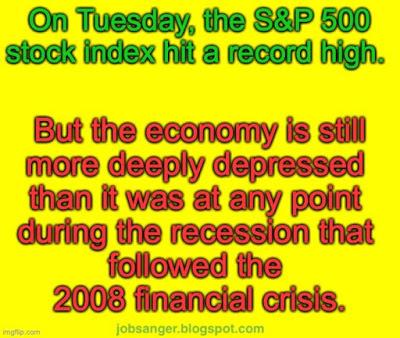 The stock market reached a record high this last week, and both Trump and Pence said it showed the economy is bouncing back and is in good shape. Unfortunately, that simply isn't true.
The stock market reached a record high this last week, and both Trump and Pence said it showed the economy is bouncing back and is in good shape. Unfortunately, that simply isn't true.The stock market is not the economy. It's not even a reliable indicator of how the economy is doing. The stock market tells us the rich are getting richer -- even in the midst of this deep recession.
But the poor, working class, and middle class are not doing so well. They remain prisoner to the real economy -- the one with high unemployment and low GDP -- the one stuck in a deep recession.
Here is how Nobel Prize-winning economist Paul Krugman describes the economic situation in his New York Times column:
On Tuesday, the S&P 500 stock index hit a record high. The next day, Apple became the first U.S. company in history to be valued at more than $2 trillion. Donald Trump is, of course, touting the stock market as proof that the economy has recovered from the coronavirus; too bad about those 173,000 dead Americans, but as he says, “It is what it is.”
But the economy probably doesn’t feel so great to the millions of workers who still haven’t gotten their jobs back and who have just seen their unemployment benefits slashed. The $600 a week supplemental benefit enacted in March has expired, and Trump’s purported replacement is basically a sick joke.
Even before the aid cutoff, the number of parents reporting that they were having trouble giving their children enough to eat was rising rapidly. That number will surely soar in the next few weeks. And we’re also about to see a huge wave of evictions, both because families are no longer getting the money they need to pay rent and because a temporary ban on evictions, like supplemental unemployment benefits, has just expired.
But how can there be such a disconnect between rising stocks and growing misery? . . .
The truth is that stock prices have never been closely tied to the state of the economy. As an old economists’ joke has it, the market has predicted nine of the last five recessions.
Stocks do get hit by financial crises, like the disruptions that followed the fall of Lehman Brothers in September 2008 and the brief freeze in credit markets back in March. Otherwise, stock prices are pretty disconnected from things like jobs or even G.D.P.
And these days, the disconnect is even greater than usual.
For the recent rise in the market has been largely driven by a small number of technology giants. And the market values of these companies have very little to do with their current profits, let alone the state of the economy in general. Instead, they’re all about investor perceptions of the fairly distant future. . . .
So big tech stocks — and the people who own them — are riding high because investors believe that they’ll do very well in the long run. The depressed economy hardly matters.
Unfortunately, ordinary Americans get very little of their income from capital gains, and can’t live on rosy projections about their future prospects. Telling your landlord not to worry about your current inability to pay rent, because you’ll surely have a great job five years from now, will get you nowhere — or, more accurately, will get you kicked out of your apartment and put on the street.
So here’s the current state of America: Unemployment is still extremely high, largely because Trump and his allies first refused to take the coronavirus seriously, then pushed for an early reopening in a nation that met none of the conditions for resuming business as usual — and even now refuse to get firmly behind basic protective strategies like widespread mask requirements.
Despite this epic failure, the unemployed were kept afloat for months by federal aid, which helped avert both humanitarian and economic catastrophe. But now the aid has been cut off, with Trump and allies as unserious about the looming economic disaster as they were about the looming epidemiological disaster.
So everything suggests that even if the pandemic subsides — which is by no means guaranteed — we’re about to see a huge surge in national misery.
Oh, and stocks are up. Why, exactly, should we care?

